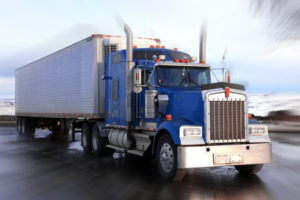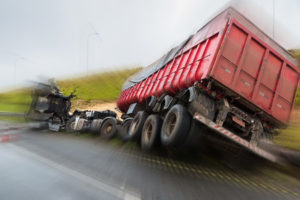
Improperly loaded or secured cargo can shift and affect a truck’s stability or handling, fall from or through the truck, spill, leak or blow off the truck. Improperly secured truck equipment like tarps and spare tires can fall off, be thrown from the truck or blow off. Tailgates and doors which are not properly secured can open and allow cargo toe fall from the truck or cause of other problems. Tragically, these type of load accidents cause injury or death on a regular basis. Almost all are preventable. Proper loading and securing the load and equipment goes a way to preventing these problems.
Changes in the truck’s direction and speed during routine maneuvers like speeding up, braking, stopping, or turning corners can cause the load to shift unless the cargo is properly loaded and secured. The cargo can move forward, backward, left, right or up. During braking the cargo can move forward. Turning a corner or swerving can cause the cargo to shift to the right or left. Some loads like liquids, livestock, and other items can shift with small amount of braking or steering.
Unbalanced loads increase the risk of a truck rolling over. The weight of cargo should be centered as close as possible to the truck’s center-line to reduce this risk. Tall and heavy cargo increases rollover risk. Truck drivers must take extra care in turns to avoid a rollover.
 Cargo which is not properly loaded or secured can fall off the truck onto other vehicles with potentially dangerous or deadly consequences. In one situation which happened on the Kansas Turnpike a semi was carrying a very large piece of farm equipment (a combine) on a flatbed trailer. The trailer and cargo were seen pitching badly. A few miles up the road the combine fell off the trailer and into the adjacent lane. Fortunately, the combine ended up on the road surface and not another vehicle. Had it landed on a car in the adjacent traffic lane this could have been fatal or caused catastrophic injury. Even if it does not hit another vehicle it can end up on the road way creating a traffic hazard for other drivers.
Cargo which is not properly loaded or secured can fall off the truck onto other vehicles with potentially dangerous or deadly consequences. In one situation which happened on the Kansas Turnpike a semi was carrying a very large piece of farm equipment (a combine) on a flatbed trailer. The trailer and cargo were seen pitching badly. A few miles up the road the combine fell off the trailer and into the adjacent lane. Fortunately, the combine ended up on the road surface and not another vehicle. Had it landed on a car in the adjacent traffic lane this could have been fatal or caused catastrophic injury. Even if it does not hit another vehicle it can end up on the road way creating a traffic hazard for other drivers.
Unbalanced, improperly secured or tied down loads can cause weight shifts making the truck harder or impossible to control with disastrous consequences. In an unfortunate case which happened in the Kansas City area a semi truck loaded with candy fell over on it’s side crushing a car beside it resulting in the wrongful death of the occupant. Heavy items which are not properly secured can move, damage or destroy the trailer and fall onto the road or vehicles in the vicinity resulting in death or injury. These are just two examples of why it is extremely important that cargo is properly loaded and secured.
Federal Safety Rules
The United States government has created a comprehensive set of rules to improve truck safety. These are called the Federal Motor Carrier Safety Regulations or FMCSRs for short. Most states have similar truck safety regulations. The FMCSRs require commercial motor vehicle drivers to know how to properly handle and secure cargo and what can happen if the cargo is not properly secured.
The FMCSRs contain both general rules for preventing the loss or shifting of the load as well as very specific and detailed rules for the type and condition of equipment used to secure cargo. The FMCSR generally require cargo be secured well enough to prevent it from falling off, spilling, leaking or blowing from the truck. To avoid dangerous cargo shifting the FMCSRs require that the load be secured or immobilized well enough, so it does not affect the truck’s maneuverability or stability.
The FMCSRs include detailed specifications for chains, webbing, wire rope and other gear used to tie down loads. Load limits for different types of rope, strapping, webbing, chains and tiedowns are prescribed as are the number of tiedowns. There are rules about how cargo is to be placed and restrained. For example wedges, chocks or other similar equipment is required for freight which is likely to roll.
Detailed rules for how specific kinds or cargo must be secured are included in the FMCSRs. There are specific, detailed rules for how cargo like logs, lumber, metal coils, paper rolls, concrete pipe, cars, light trucks, vans, heavy vehicles, equipment, machinery, crushed vehicles, boulders and other items must be secured. As an example, when cars are being transported at least two tie downs are required and both the front and back must be restrained so the car does not move in any direction.
In addition to properly securing the load, the FMCSRs prohibit drivers from operating commercial motor vehicles if the cargo is not properly loaded and secured as the FMCSRs require. Before driving, the driver must inspect the cargo to confirm that the loading and securement comply with the requirement of the FMCSRs. The driver is required to conduct another inspection within the first fifty miles and make any necessary changes to make sure the load cannot shift or fall off the truck. After the truck has driven 150 miles or three hours, whichever comes first, the driver is required to again inspect the cargo and make any necessary changes. There are special rules for sealed trailers.
Most trucking companies in the United States are required to follow these rules. If you were injured because the driver lost control, the truck rolled due to improperly loaded or secured cargo or items fell from the truck you may be entitled recover damages.
Prevalence Of Accidents
These FMCSRs are important to help reduce the number of accidents involving improper loading or cargo securement. Despite these rules problems with load securement continue. According to the Commercial Vehicle Safety Alliance some of the most common problems with load securement are not preventing the load from shifting or falling off the truck, not properly securing truck parts like tailgates, doors and spare tires and equipment carried on the truck like forklifts, cargo straps and chains and loose, damaged or insufficient tie-downs like chains and straps.
Every year, thousands of disasters result from this unsafe practice. The FMCSA released data from 2005 showing that some 3,000 trucks were involved in cargo securement accidents that year. The following year, the agency published a Report to Congress, stating that cargo shifting and securement issues were the primary or contributing factors in at least 7% of the 147,000 total large-truck accidents in 2006.
Types Of Accidents
 Some of the accidents that result from improperly secured or loaded cargo are:
Some of the accidents that result from improperly secured or loaded cargo are:
- Jack-knifing – If a trailer truck’s heavy cargo shifts in balance, the trailer may swing to one side (resembling a jackknife) and cause the driver to lose control of the vehicle.
- Vehicle tipping or rollover – A weight shift in the cargo can also cause the whole vehicle to tip or roll over to one side.
- Falling cargo – Transported items that come lose and fall from a truck can crush vehicles or people who happen to be behind the truck. There have even been cases where cargo being transported in a closed trailer was not properly secured, broke through the side of the trailer and fell on the road.
- Spilled hazardous materials – Flammable liquids can cause fiery road accidents, and hazardous chemicals can pose serious health threats to people in the vicinity.
Injuries And Fatalities
Because of the heavy and sometimes dangerous nature of truck cargos, the injuries in these accidents can be catastrophic. Head trauma, brain injuries, broken bones, and amputations are among them. It is also unfortunately common to find fatalities in these truck crashes.
If you or your loved one has been seriously injured in Missouri or Kansas because of a truck’s improperly loaded or secured cargo, contact Flick Law Firm to help obtain the compensation you need.
LAWRENCE FLICK LAST REVIEWED AND EDITED THIS PAGE ON SEPTEMBER 1, 2020










